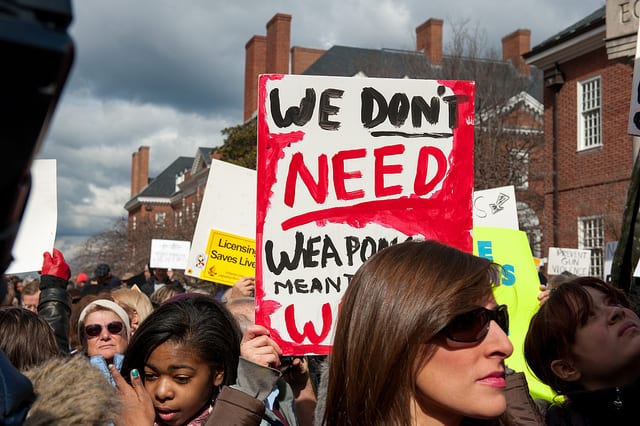Earlier this year, I was at an event chatting to a Federal Minister. Having heard that I’ve worked on gender equality issues, in particular violence against women, for nearly two decades in the US, the UK and now more recently in Australia, he asked me how my experience campaigning here compared to other countries.
I paused for a moment before answering. And then I said, “I have found it far more rewarding to work on this issue here because of Australian’s capacity to be shocked. And that shock and anger leads to meaningful action.”
I cited as an example the Port Arthur massacre, which led to widespread gun control reform. As one horrific mass shooting after another takes place in the US, including the most recent tragedy in Las Vegas, American politicians seem unwilling or unable to tackle gun control.
And I talked about what happened in the aftermath of Luke Batty’s death in 2014, when his grieving mother Rosie first faced the media and appealed to the nation for change. “If anything comes out of this, I want it to be a lesson,” she said. “Family violence happens to everybody, no matter how nice your house is, no matter how intelligent you are. It happens to anyone and everyone.”
The very next year, the Victorian Royal Commission into Family Violence was established, which produced a report and 227 recommendations. At the Federal level, COAG created an Advisory Panel on Reducing Violence Against Women and Their Children, which also published a report with 28 recommendations to “achieve lasting change”.
And I told him about the atmosphere at the very first 2015 Our Watch Awards for exemplary reporting to end violence against women, which I had the great privilege of managing in my previous role. The Awards came on a day when three women were viciously attacked by their current or former partner, all in the same state. Two of them, Tara Brown and Karina Lock, were killed.
The shock at these attacks, all of which played out in a very public setting, was palpable at the inaugural Awards. Lisa Wilkinson, one of the judges who was due to give a keynote address and present the Gold Award, arrived ashen faced. I will never forget sitting with her in a corner of the room shortly after her arrival. She said to me, “I have to rewrite my speech. I have to address what’s happened today.”
I then watched as one of this country’s finest journalists with a long standing and deep commitment to this issue (and incidentally very deserving of equal pay) took what seemed like just minutes to rework her speech into one of the most powerful I have ever heard, channeling the audience’s collective shock and imploring us to take action.
The speech she delivered that night was the basis of an editorial she delivered on the Today Show the very next morning. The numerous attacks also prompted the Courier Mail to run a powerful front page featuring high profile Queenslanders and imploring us to “Stand Up”.
When comparing all this to the country of my birth, I have often felt that the US is beyond help and lost its capacity to be shocked because domestic and gun violence, with the two often dovetailing, has simply become the new normal.
If one woman a week is killed in Australia at the hands of a current or former partner, in the US ten women are shot to death by their husbands, boyfriends and former partners, and it is so common, it frequently goes unremarked upon until the shooting turns into a larger tragedy.
Larger tragedy? The link between domestic violence and mass shootings is clear. According to a report from Everytown for Gun Safety, of the 156 mass shootings in the United States between 2009 and 2016, more than half — 54 percent — were traceable to domestic or family violence.
I was, therefore, particularly troubled by recent reports from Women’s Agenda’s own Georgina Dent, who is doing all of us a great service by staying well on top of these things.
According to Georgina’s reports, and another in the Guardian over the weekend, domestic violence may be slipping down the media and the political agenda here in Australia. And this is happening at the same time there is growing concern of renewed attempts to chip away at the gun control legislation brought in after the Port Arthur massacre.
I am worried Australians, and in particular our media and political leaders, are losing their capacity to be shocked. And that very capacity is what has driven change to help keep women and children safe.
A few years after domestic violence changed from being something that happened “behind closed doors” to an issue that shocked the nation, is it becoming Australia’s new normal? And as the atrocity of Port Arthur fades from memory, which seems unimaginable, are arguments to roll back gun control falling on more sympathetic ears?
Think about the consequences if this happens. Yes, one woman a week is far too many. But if it was easier for domestic violence perpetrators to gain access to guns, it would be so many more.
I implore Australians in this country that I am now privileged to call home to maintain this quality, this capacity to be shocked, that I have so admired.
And I implore all of us, but particularly our leaders in the media and politics, to keep domestic violence at the top of the national agenda and resist efforts to whittle away gun control legislation.
Failure to do so, quite frankly, would be shocking.
Feature image: From 2013 Rally to Prevent Gun Violence. by Jay Baker at Annapolis, MD.


